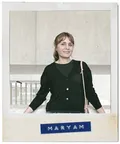
Maryam Khatibi
PhD architect | MAS ETH Housing
TUM Global Postdoc Fellowship, 2024
Postdoctoral Researcher, Professorship of Urban Design, TUM School of Engineering and Design

Academic Guests
The professorship is welcoming applications to act as a host for fellowship programs, for example Humboldt Research Fellowships , DAAD Fellowships or TUM Global Postdoc Fellowships. Applicants should see considerable synergies between their work and the work of the professorship of Urban Design and have outstanding credentials to be able to compete in these programs. To start the conversation with us, please send a 1-page CV and a 1-page description of your research aim to info.ud(at)ed.tum.de. We will get in contact with you if we see potential in developing a proposal together.
Ehemalige
PhD, Marie Curie Fellow an der TUM, 2022-2024
Postdoctoral Researcher, Professorship of Urban Design, TUM School of Engineering and Design
Karen Lee Bar-Sinai ist Architektin, Stadtplanerin und Postdoc-Stipendiatin am Lehrstuhl für Städtebau an der Technischen Universität München. Sie erhielt ihren B.Arch. vom Technion - Israel Institute of Technology, hat einen MSc in Cities von der London School of Economics und ein Loeb-Stipendium von der Harvard Graduate School of Design. Ihre Doktorarbeit am Technion - IIT befasst sich mit der robotergestützten Fertigung vor Ort mit gefundenen Materialien für die Architektur und den Landschaftsbau, die über architektonische Objekte hinausgehen und territoriale Maßstäbe bilden. Ihre Postdoc-Forschung konzentriert sich auf robotergesteuerte modulierende Böden für Umweltleistungszwecke. Vor ihrer Promotion war Karen Lee Mitbegründerin von SAYA/Design for Change, einem Architektur- und Stadtplanungsbüro. Sie hat am Technion IIT und an der Bezalel Academy of Arts and Design, Jerusalem, Architektur- und Stadtplanungsstudios und -seminare für Studenten und Absolventen unterrichtet.
Mittlerweile ist Karen Lee Bar-Sinai Assistenzprofessorin für Materialien und Design in der Abteilung für Landschaftsarchitektur an der Harvard Graduate School of Design. Ihre Forschung konzentriert sich auf die Beziehungen zwischen Materie, Umwelt und Technologie. Sie erforscht, wie präzise Werkzeuge genutzt werden können, um Materialien, Design und Konstruktion auf verschiedenen Ebenen neu zu überdenken.
Visiting Lecturer at TUM, 2022-2023
Bahar Gedikli is a professor in the Department of City and Regional Planning, Faculty of Architecture at the Middle East Technical University (METU), Ank
Doc. sc. ETH Zurich, TUM University Foundation Fellow, 2021-2023
Postdoktorantin, Professur für Urban Design, TUM School of Engineering and Design
PhD, Anna Boyksen Fellow an der TUM, 2020-2023
Associate Professor, KTH School of Architecture, Royal Institute of Technology, Stockholm
Meike Schalk studierte Architektur an der Hochschule der Künste (heute UDK) in Berlin und der Architectural Association in London. Sie promovierte 2007 im Fach Theoretische und Angewandte Ästhetik der Landschaftsarchitektur an der SLU, Swedish University of Agricultural Sciences. Seit 2015 ist sie habilitierte Professorin in Architektur, Urban Design und Urbaner Theorie, nach ihrer Berufung als Juniorprofessorin in 2011 an die KTH Architekturschule, Royal Institute of Technology in Stockholm. Schalk co-initiierte die feministische Lehr- und Forschungsgruppe FATALE (Feminist Architecture Theory Analysis Laboratory Education), 2007-2012.
PhD, Visiting Lecturer at TUM, 2021-2022
Tom Shaked is an architect, computational designer, and postdoctoral fellow at the Chair of Urban Design at the Technical University of Munich. He received his B.Arch and M.A. from Tel Aviv University and is a two-time Azrieli Research Fellow (2012-2014, 2018-2020). His Ph.D. at the Technion – Israel Institute of Technology focused on developing robotic tools for adaptive fabrication, integrating sensory data and manual capabilities into construction processes. His postdoctoral research focuses on collective robotic construction and autonomous systems in unstructured environments. Prior to his PhD, Tom developed and patented methods and tools for design, simulation, and fabrication in partnership with companies such as Apple and Nike. He has taught undergraduate and graduate architecture studios and advanced digital fabrication and robotics at the Technion IIT, Tel Aviv University, and Confluence Institute for Innovation and Creative Strategies in Architecture, France. He currently teaches a seminar on Precision Landscapes at TUM.
Dr. Ing., Architektin Charlotte Lao Schmidt
Charlotte Lao Schmidt (°1982) is a spatial designer currently based on Bohol, the Philippines. She graduated, with distinction, as a Diploma Eng. Architect with speci- alisation in urban design, from Technical University Braunschweig, Germany (2010).
As an Architect and Urban Designer, she has been, amongst others, a collaborator with 51N4E in Brussels (2011-2019), working on a diverse set of projects on mul- tiple scales across Europe.
Since moving to the Philippines she has formed SOFT SPOT (2019), a collabo- rative space and practice on the fringe, hosting and building a cross-cultural and trans-disciplinary creative community through research, projects and experiences.
As a Scenographer she has contributed to the design of exhibitions on cultural and spatial themes, such as for IABR 2016 ‚The Next Economy’ in Rotterdam, ‘A good City has Industry’ at Bozar in Brussels, IABR 2018 ‚You are here’ at WTC in Brussels, ‚Urban Factory Today’ at Bozar in Brussels, and MOOI Festival 2018 at De Studio in Antwerp.
Assist. Prof. Dr. Matevž Juvančič
Born in Ljubljana, Slovenia, Matevž Juvančič is an architect, a teacher and a researcher at the Faculty of Architecture, University of Ljubljana. His research work was initially focused on architectural education of general public and public participation. In later years, he has become fascinated by anonymous, generic elements in urban environments as well as more distinct ones, studying their significance in space orientation, space use and spatial character. His main research focus has recently shifted towards spatial semantics, spatial character in connection with identity issues, and fundamental questions related to what makes places recognizable and identifiable. At the Faculty of Architecture, he is teaching at bachelor, master and doctoral level. Large proportion of his daily activities consist of Erasmus and other international exchange programmes management. He has been practicing architecture since 2002 and is a licensed architect.
contact: matevz.juvancic@fa.uni-lj.si
Born in Asola in 1985, Federico Marcolini studied architecture at Politecnico di Milano, IUAV in Venice and Technische Universität in Munich. After some years abroad as an architect, he started a PhD at Politecnico di Milano, ABC Department, in 2016. His research focuses on architecture and its role in the enhancement of decommissioned railways and their territories. Since 2016 he collaborates as teaching assistant in various design courses at Polo Territoriale di Mantova – Politecnico di Milano focused on the relationship between the ancient and the new in historical contexts such as Sabbioneta, Manova, Porto and Lisbon. In 2018, with the team of Polo Territoriale di Mantova held by Prof. Federico Bucci, Prof. Eduardo Souto de Moura, Prof. Angelo Lorenzi and Prof. Barbara Bogoni, he participated in the Piranesi Gran Prix de Rome Competition, winning the first prize.
contact: federico.marcolini(at)tum.de
contact: giorgia.aquilar(at)tum.de